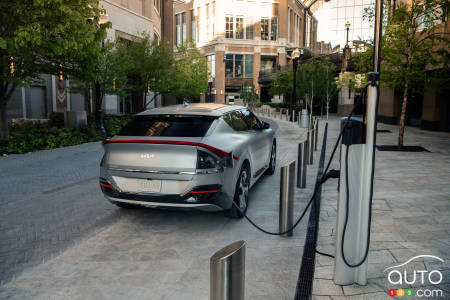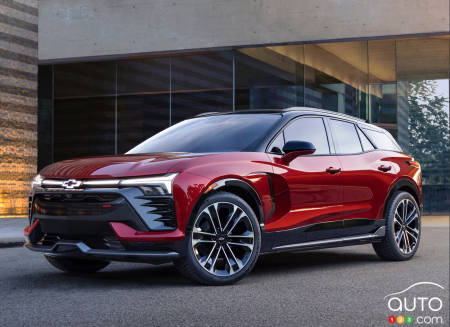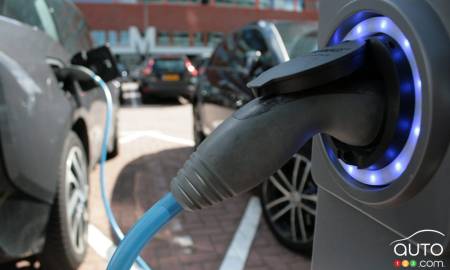Big news in the world of electrification as seven major automakers announce a joint venture to create a new EV charging network. The goal, to accelerate the transition to electric vehicles in North America, by making charging of EVs easier, more accessible and more reliable.
The manufacturers involved are BMW, General Motors (GM), Honda, Hyundai, Kia and Mercedes-Benz, as well as the Stellantis Group.

The company that is to emerge from this partnership will be charged with developing an expansive charging network counting at least 30,000 chargers. This should encourage more people to make the switch, as it will be easier than ever to find places to recharge their vehicles.
This new partnership is independent of the deals some of the automakers involved have made to access around 12,000 chargers in Tesla’s North American charging network, by the adoption of that EV maker’s NACS charger connector standard. Among the manufacturers committed to adopting the NACS standard, Polestar, Mercedes-Benz, Volvo, Rivian, Nissan and GM.
The joint venture will mobilize public and private funds to accelerate the installation of a high-power charging network for consumers. The new stations will be accessible to all electric vehicles from any manufacturer, provided they use either the CCS charging standard or Tesla's own NACS.
The group of automakers aims to create the largest reliable network of high-power charging stations in North America. The joint venture is expected to be active this year, subject to customary closing conditions and regulatory approvals.
The first stations are scheduled to open in the USA in the summer of 2024, with Canadian stations following later. Each location will be equipped with several high-power DC charging stations, making long-distance journeys easier for customers, not least by reducing recharging times.

As things stand at present, there is a shortage of ultra-fast charging stations, and the reliability of the network is often criticized by users.
The new network will be powered exclusively by renewable energies.
It is also promised that the stations will be located in convenient, easily accessible places, with awnings where possible. We'll also make sure that services such as toilets and catering are close at hand.
The first stations will be built in metropolitan areas and along major highways, in other words where many motorists are used to traveling, whether for work or vacation.
Thanks to connected services, it will also be possible to plan itineraries and make reservations, payments and more.

The NREL (National Renewable Energy Laboratory) estimates that 182,000 DC fast chargers will be needed to support the 30 to 42 million plug-in vehicles expected on the road by 2030. In the USA, 32,000 charging stations are currently available for 2.3 million vehicles.
It's thus good news to see that charging will become more accessible. And while all this is being done, everyone is keeping an eye on technological progress being made in the field. If solid-state batteries come into widespread use by 2023 as hoped, most EVs then should have ranges of over 1,000 km. Which means that the vast majority of EV owners will be charging their vehicle at home and not on the public grid.
Stay tuned.
.jpg?scaledown=450)
As for the seven automakers involved, here's what their executives had to say about the agreement.
BMW Group CEO Oliver Zipse: “North America is one of the world’s most important car markets – with the potential to be a leader in electromobility. Accessibility to high-speed charging is one of the key enablers to accelerate this transition. Therefore, seven automakers are forming this joint venture with the goal of creating a positive charging experience for EV consumers. The BMW Group is proud to be among the founders.”
GM CEO Mary Barra: “GM’s commitment to an all-electric future is focused not only on delivering EVs our customers love, but investing in charging and working across the industry to make it more accessible. The better experience people have, the faster EV adoption will grow.”
Honda CEO Toshihiro Mibe: “The creation of EV charging services is an opportunity for automakers to produce excellent user experiences by providing complete, convenient and sustainable solutions for our customers. Toward that objective, this joint venture will be a critical step in accelerating EV adoption across the U.S. and Canada and supporting our efforts to achieve carbon neutrality.”
Hyundai CEO Jaehoon Chang: “Hyundai’s investment in this project aligns with our ‘Progress for Humanity’ vision in making sustainable transportation more accessible. Hyundai’s expertise in electrification will help redefine the charging landscape and we look forward to working with our other shareholders as we create this expansive high-powered charging network.”
Kia CEO Ho Sung Song: “Kia's engagement and investment in this high-powered charging joint venture is set to increase charging access and convenience to current and future drivers and therefore accelerate the transition to EVs across North America. Kia is proud to be an important part of this joint venture with other reputable automakers as we embark on a journey towards seamless charging experiences for our customers and further strengthening Kia’s brand identity in the EV market.”
Mercedes-Benz Group CEO Ola Källenius: “The fight against climate change is the greatest challenge of our time. What we need now is speed – across political, social and corporate boundaries. To accelerate the shift to electric vehicles, we’re in favor of anything that makes life easier for our customers. Charging is an inseparable part of the EV-experience, and this network will be another step to make it as convenient as possible.”
Stellantis CEO Carlos Tavares: “We intend to exceed customer expectations by creating more opportunities for a seamless charging experience given the significant growth expected in the market. We believe that a charging network at scale is vital to protecting freedom of mobility for all, especially as we work to achieve our ambitious carbon neutrality plan. A strong charging network should be available for all - under the same conditions - and be built together with a win-win spirit. I want to thank each colleague involved, as it is a milestone example of our collective intelligence to listen and serve our customers.”


fr.jpg?scaledown=450)
